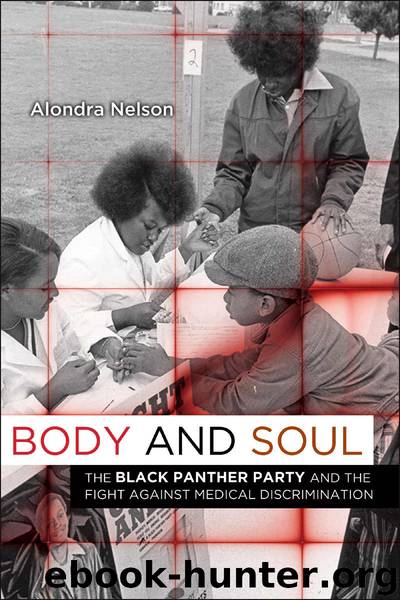Body and Soul: The Black Panther Party and the Fight against Medical Discrimination by Alondra Nelson

Author:Alondra Nelson [Nelson, Alondra]
Language: eng
Format: azw3
Publisher: University of Minnesota Press
Published: 2011-10-19T16:00:00+00:00
5.
AS AMERICAN AS CHERRY PIE
Contesting the Biologization of Violence
Black doctors, neurosurgeons, psychiatrists, and concerned citizens, where are you? Please come forth to prevent this dangerous form of pacification! In the meantime, black brothers and sisters, shelter your cingulum, amygdalas and thalamuses from assault by a neurosurgeon who wants to make you a “better person.”
—Gloria Evans-Young, “Letter to the Editor,” Ebony
In 1973 the Black Panthers became involved in a challenge to the formation of the Center for the Study and Reduction of Violence, a research center at the University of California at Los Angeles that would be dedicated partly to investigating the biological etiology of violence. In this instance, the Party tilted emphasis from providing healthcare to underserved communities, with attention to medical mistreatment that characterized its ongoing clinic work and sickle cell activism, to focusing on the dismantling of both the biologization of social issues and repressive medical surveillance. In other words, with this campaign, the Panthers sought to protect those who were at risk of overexposure to the power of the healthcare state. To this end, the Party’s tactics also shifted as was required by the matter at hand, from the creation of alternative medical care services and institutions to a “politics of knowledge,” via legal advocacy, lobbying, and the “recontextualization” of biomedical theories.1
Heralded by California governor Ronald Reagan in his January 1973 State of the State address, the proposed “violence center” would support research into the origins and causes of violence. The center’s conceptual architect and foremost proponent was Dr. Louis Jolyon “Jolly” West, director of the UCLA Neuropsychiatric Institute that was to house it, and a psychiatrist whose colorful and controversial professional history included studies of brainwashing, hypnosis, and sleep deprivation; early clinical experiments with LSD; and research correlating the era’s student activism with antisocial behavior.2 In keeping with this trajectory, West proposed a slate of biomedical studies to address what he deemed the “veritable plague” of violence.3
Huey P. Newton was alarmed when he became aware of plans to establish the center. In particular, the Panther chairman objected to the fact that some of the proposed research programs specifically targeted minority groups and vulnerable populations for participation in experimental psychiatric studies—including invasive brain surgery. The Black Panthers joined forces with civil rights, feminist, prisoners’ rights, and students’ organizations—made up of the western region chapter of the NAACP, the National Organization for Women (NOW), the Mexican-American Political Association (MAPA), Committee Opposing Psychiatric Abuse of Prisoners (COPAP), United Farm Workers Organizing Committee (UFOC), and the California Prisoners’ Union (CPU)—to attempt to block public funding to the violence center and thereby impede its formation. This Party-led coalition was allied with Fred J. Hiestand, an activist–attorney who represented its interests with regard to the center in negotiations with politicians and before state legislative bodies.4 In April 1973 Hiestand testified before the California Senate Health and Welfare Committee on behalf of this coalition; reading from a prepared “administrative complaint”—a document more tactical than legal, but one that nonetheless bore the authoritative imprimatur
Download
This site does not store any files on its server. We only index and link to content provided by other sites. Please contact the content providers to delete copyright contents if any and email us, we'll remove relevant links or contents immediately.
| African-American Studies | Asian American Studies |
| Disabled | Ethnic Studies |
| Hispanic American Studies | LGBT |
| Minority Studies | Native American Studies |
Cecilia; Or, Memoirs of an Heiress — Volume 1 by Fanny Burney(32558)
The Great Music City by Andrea Baker(32018)
Cecilia; Or, Memoirs of an Heiress — Volume 2 by Fanny Burney(31956)
Cecilia; Or, Memoirs of an Heiress — Volume 3 by Fanny Burney(31941)
We're Going to Need More Wine by Gabrielle Union(19046)
All the Missing Girls by Megan Miranda(16023)
Pimp by Iceberg Slim(14506)
For the Love of Europe by Rick Steves(14121)
Bombshells: Glamour Girls of a Lifetime by Sullivan Steve(14073)
Talking to Strangers by Malcolm Gladwell(13370)
Norse Mythology by Gaiman Neil(13363)
Fifty Shades Freed by E L James(13239)
Mindhunter: Inside the FBI's Elite Serial Crime Unit by John E. Douglas & Mark Olshaker(9339)
Crazy Rich Asians by Kevin Kwan(9290)
The Lost Art of Listening by Michael P. Nichols(7506)
Enlightenment Now: The Case for Reason, Science, Humanism, and Progress by Steven Pinker(7311)
The Four Agreements by Don Miguel Ruiz(6763)
Bad Blood by John Carreyrou(6621)
Weapons of Math Destruction by Cathy O'Neil(6279)
